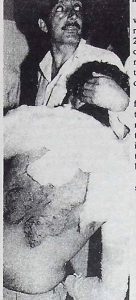
SRINAGAR, Kashmir: Silent, barefoot men dug a very small grave recently at the Idgar Martyrs Cemetery, a new landmark on the outskirts of this battered city. The grave was for 6 year old Sajad Ahmad Sufi, shot by Indian troops, his relatives said as he tried to hide between his father’s legs during a search of the family home.
“Put aside the malnutrition, the shortage of vaccines, the gastroenteritis, the trauma, the nightmares of children,” said Altaf Hussain, a pediatrician. “Here we have 3 year olds, 4 year olds subjected to bullets. And to add insult to injury we hear them dubbed terrorists on the evening news from Delhi.”
Over the least two years, there has been a silent revolution in the Kashmir valley, the verdant home of poetry and song that Mogul Emperors called Paradise on Earth.
Small groups of armed Muslim separatists, who 15 months ago were described as a radical fringe attractive mostly to unemployed youth, now apparently have the support of an alienated influential middle class. Kashmiris say the introduction late last year of thousands of Indian troops and paramilitary forces who patrolled deserted streets and searched houses only speeded up a process of alienation that has been’ going on for more than 40 years.
They have made every Muslim a suspect,” a businessman said of the Indian armed forces’ attempts to subdue a fast growing independence movement, “We are all militants now.”
More than 10,000 civil servants are said to have signed an “open letter to the citizens of the world” cataloging the human toll of extended curfews violent searches, the interrogations of young men and women, the gang rape of a bride and the firing on mourners carrying the body of the assassinated religious leader, Maulvi Mohammad Farooq.
“It was not bullets,” the letter says “but something worse than venom being poured out of those guns that has shattered hundreds of families brought shame to Indian democracy and left a scar on the psyche of Kashmir that would never be removed.
In New Delhi Jagmohan who served twice as Governor of Jammu and Kashmir state, said in an interview that by the beginning of his second term “all the components of power had been taken over by the terrorists or their supporters.” Mr. Jagmohan who uses only one name, served from April 1984 to July 1989 and from January through May of this year. He was dismissed after troops fired on a funeral procession, killing at least 4 7.
“By mid-1988,” he said, “they could call a general strike and the government couldn’t do anything. In two years they had the upper hand in every aspect of the establishment administration, schools, and hospitals.” The former governor said he had no alternative but to impose long curfews one lasted 1 6 days and crack down on militancy while trying to rebuild local administration.
Article extracted from this publication >> June 22, 1990